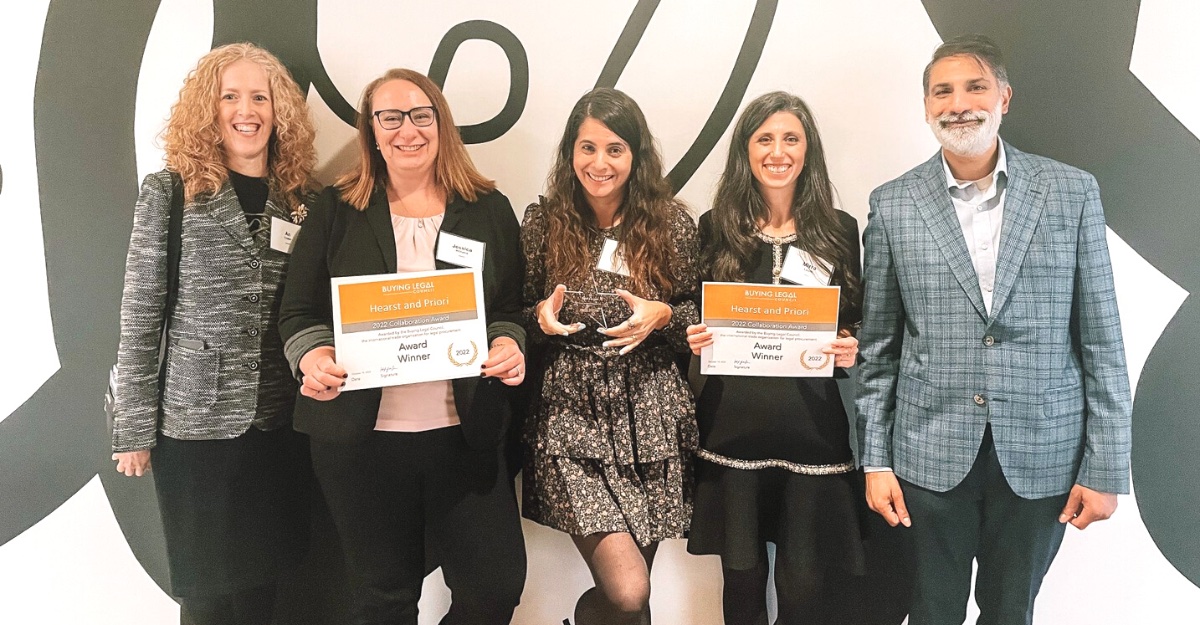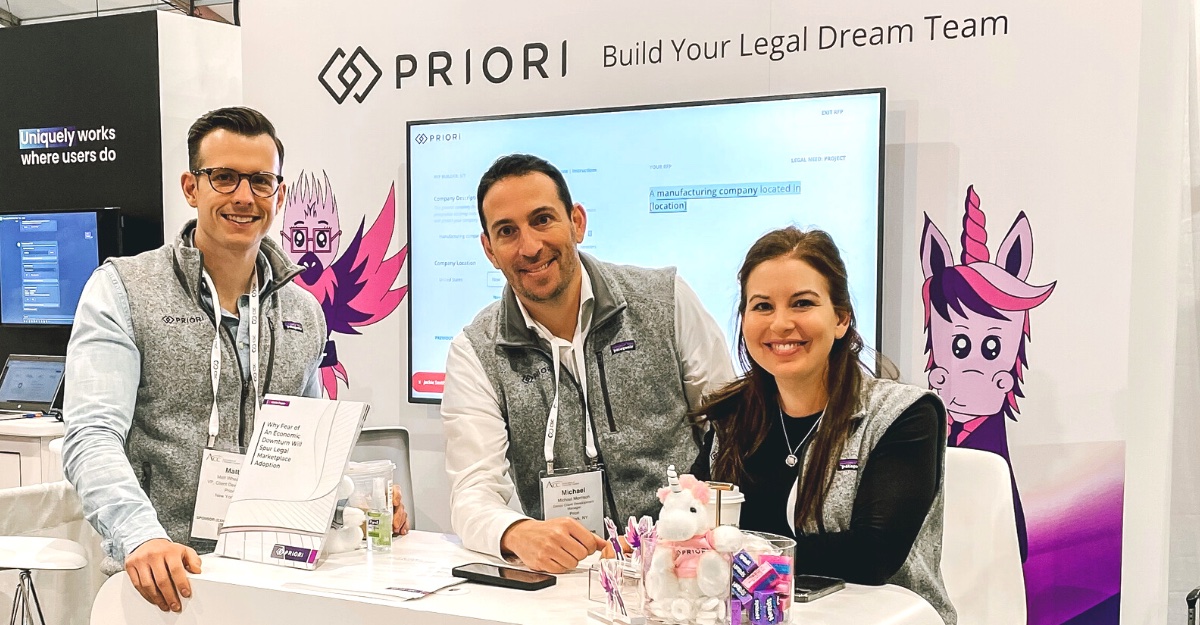
The Priori team shared insights about diversity data, filling labor gaps, and more at fall events
The Priori team attended over a dozen events this past fall and although it was a whirlwind of flights, hotels, meetings, dinners and more, the ability to meaningfully connect with the legal community, learn about new trends and share our experiences and expertise made it all worth it. From the difference between alternative legal service providers (ALSPs) and legal marketplaces to the impact of technology on diversity initiatives, these are the highlights of our fall travels.
Filling Legal Labor Gaps Using Technology

Priori Senior Client Development Manager, Erin Dunn, moderated a roundtable discussion at this year’s Women, Influence & Power in Law (WIPL) Conference in October about “How to Fill Labor Gaps and Meet Diversity Goals.” This topic was especially salient in light of the Great Resignation which saw millions of Americans leave their jobs at a rapid rate. Additionally, in-house corporate legal departments are facing budget cuts and hiring freezes. Dunn and the participants discussed the critical need for flexible options when it comes to the provision of legal services.
With corporate legal department workloads increasing in part due to the uptick in complexity of the regulatory landscape, “doing more with less” has never been more important. Our roundtable at WIPL discussed how alternative legal services providers (ALSPs)—or a “business that provides legal-related services as an alternative to a traditional law firm”—can help fill these labor gaps. The different types of ALSPs that were covered included:
-
Legal process outsourcing (or the offshoring of rote legal work)
-
Staffing companies that W-2 lawyers who are placed exclusively with an in-house legal department
-
Independent ALSPs and consultants.
The data shows that while ALSPs can help relieve some of the pressure on legal departments when it comes to workload, they are being underutilized, with half of law firms and legal departments saying they only outsource 1-19% of their work to ALSPs.
Beyond ALSPs, the roundtable discussed how legal marketplaces offer a one-stop shop for work performed by ALSPs as well as work requiring a more complex legal analysis. Providing a large vetted network of options for a variety of legal services, legal marketplaces facilitate access to ALSPs as well as law firms and solo practitioners. Priori Marketplace users report a 60% cost savings as compared to traditional law firm solutions and that they save over 80% of the time it once took to identify the proper provider. Additionally, legal marketplaces facilitate the bolstering of diversity, equity and inclusion (DE&I) programs. Platforms like the Priori Marketplace open up access to a diverse group of highly qualified attorneys whom users otherwise may not have had access to, and by doing this provide an easy and efficient avenue to truly make an impact on the DE&I goals set by corporate in-house teams.
Promoting D&I and a Legal “Patient Portal”

Improving diversity in the legal industry was a common thread at the events we attended this year. It’s no secret that progress on diversity in the legal industry is moving at a relatively slow pace. In the ABA’s most recent Model Diversity Survey they explained its current status by referencing the famous quote: “The more things change, the more they stay the same.” At the 2022 Buying Legal Conference (BLC) in October, using data to address these gaps was an important topic.
Priori’s Chief Product Officer and Co-Founder Mirra Levitt discussed how Priori’s new Scout platform helps address diversity (and other) issues for legal departments by harnessing data. She was joined by Scout beta partners Jessica Williams, Senior Operations Manager, Office of the General Counsel at Hearst and Wendy Butler Curtis, Chief Innovation Office at Orrick, for a panel discussion about “Game-Changing Data: The Who, What, When, and How of Metrics to Support Your Business.”
The panel discussed how data-driven transparency is key for legal departments to properly analyze their relationships with law firms and understand the talent within those existing firm relationships. Williams pointed to D&I as a key use case for the team at Hearst. Prior to Scout, they were pulling data for their D&I initiatives manually, which meant requesting information from firms or finding publicly available data on the web which may be inaccurate. There were many issues with this and chief among them was the time it took to gather and aggregate that data. Having access to a data platform like Scout immediately solved that problem for Hearst.
Curtis talked about the issue from the law firm side and explained that there needed to be a “patient portal” for law firm clients. Just as having access to data through patient portals has improved the doctor-patient relationship, having access to data about law firms through a platform like Scout improves the attorney-client relationship. And not only does it improve the client experience, but it also aids the firm because it means that the service conversation will start at an advanced level. This kind of data transparency is game-changing for everyone involved.
How Legal Work is Changing

This October, we sponsored the Association of Corporate Counsel (ACC) Annual Meeting, where we were fortunate to connect with so many great members of the in-house community. The panels and speakers shared a wealth of information about relevant and fascinating topics.
One of our favorites was “Job Dissatisfaction and the Changing Priorities of the In-House Lawyer,” which touched on some of the themes covered at WIPL, such as the way legal professionals are rejecting working practices that don’t align with their personal goals. The panelists shared tips on keeping a sustainable working environment, such as blocking time on your calendar to ensure that you focus on your most important tasks uninterrupted, as well as insights into how work changed during the pandemic, like the unintended positive consequence of remote work empowering employees to be more open and honest when in the comfort of their home. In general, the discussion highlighted the fact that there is still a lot of work to do toward normalizing the new work environment and providing tools to facilitate success. Time is of the essence for this work as in-house legal teams continue to battle attrition.
We also enjoyed “The Legal Team of 1: A Trail Map to Success,” a panel discussion covering how in-house lawyers can establish themselves as valuable business partners by defining success, building rapport and evolving as data-driven leaders. There was some incredibly useful advice in this panel, from identifying low-hanging fruit to getting quick wins. The panelists explained how to hit the ground running and provided an overview of the tech tools that are instrumental to success as an in-house lawyer. Approachability and being personable were personality traits that were highlighted as being imperative in this role. Thoughtful communication and relationship building can help you collaborate with and educate your business partners to place your team on a path to success.
It’s hard to believe, but these highlights came from just a fraction of the events we attended this fall. Making deep connections and sharing our knowledge was a pleasure. If we missed you, please feel free to reach out. Find us in person or virtually at an upcoming event, or connect with us on LinkedIn. Stay tuned for more information about our plans for 2023